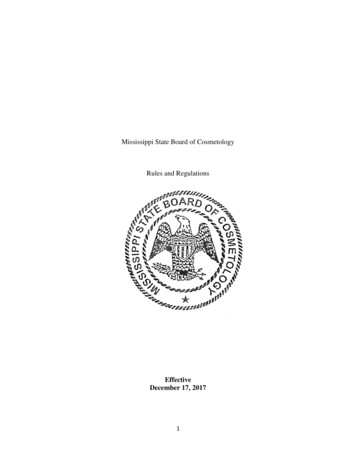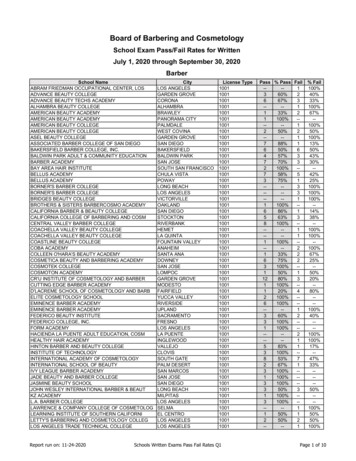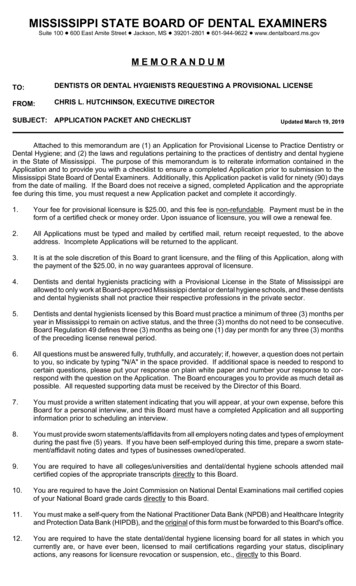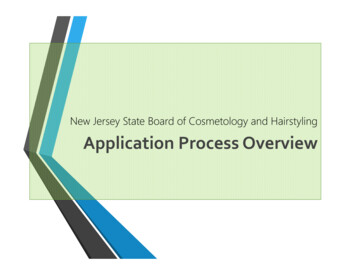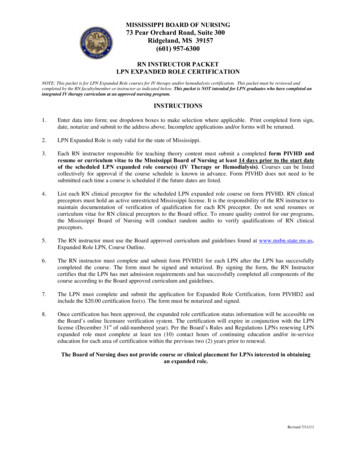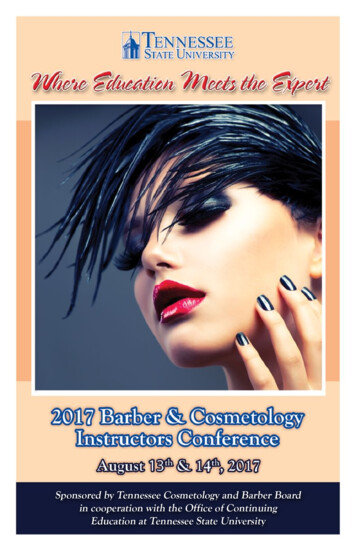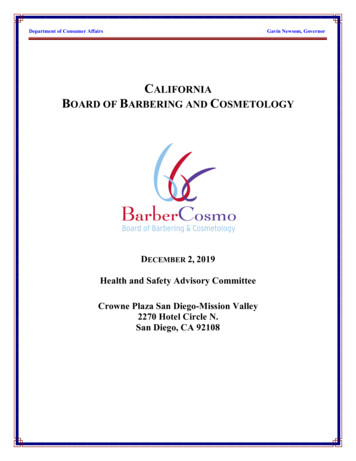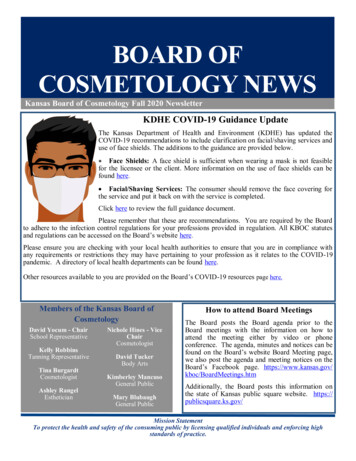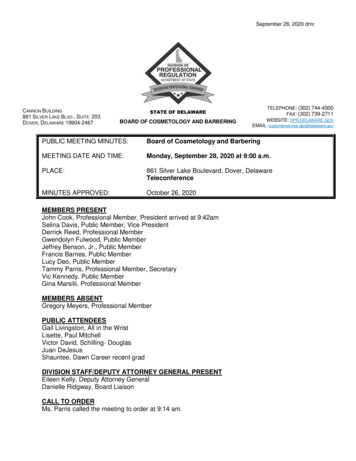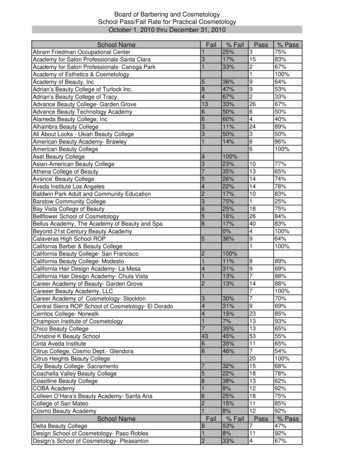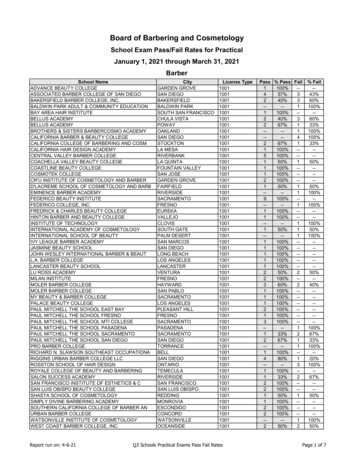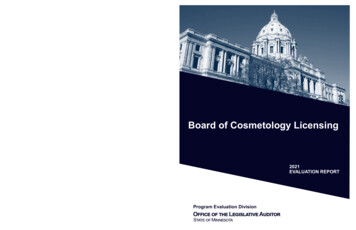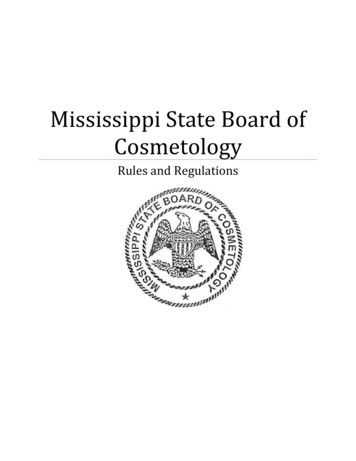
Transcription
Mississippi State Board ofCosmetologyRules and Regulations
Title 30:Professions and OccupationsPart 2101:Cosmetology, Board ofPart 2101 Chapter 1: GeneralRule 1.1 Authorization and ApplicabilityA.The following Rules and Regulations are adopted in conformity with Chapter 7 of Title73 of the Mississippi Code of 1972 as amended, pursuant to the authority vested in theMississippi State Board of Cosmetology.B.These Rules and Regulations are applicable to all persons licensed or registered inaccordance with the provisions of Chapter 7 of Title 7 of the Mississippi Code of 1972 asamended, and are effective as of July 1, 2000 and will continue pursuant to law.Source: Miss. Code Ann. § 73-7-7 (Rev. 2012)Rule 1.2 Tenses, Gender and NumberFor the purpose of these rules and regulations, the present tense includes the past and futuretenses, and the future, the present; the masculine gender includes the feminine and the feminine,the masculine; and singular includes the plural, and the plural the singular.Source: Miss. Code Ann. § 73-7-7 (Rev. 2012)Rule 1.3 DefinitionsAs used in this Chapter, unless the context otherwise requires:A.“Agent” means a member of the Board or any of its authorized representatives.B.“Board” means the Mississippi State Board of Cosmetology.C.“Cosmetology Law” or “Law” means Chapter 7 of Title 73 of the Mississippi Code of1972 as amended.D.“Establishment” means cosmetological establishment; school or salon.E.“Practitioner” means an individual who is practicing one of the professions regulated bythe Mississippi State Board of Cosmetology, as defined in Section 73-7-2 of theMississippi Code of 1972 as amended.F.“Salon” means an establishment operated for the purpose of engaging in the practice ofcosmetology, or manicuring and pedicuring, or esthetics, or wigology, or all.1
G.“School” means an establishment, public or private, operated for the purpose of teachingcosmetology, or manicuring, or pedicuring, or esthetics, or wigology, or all.H.“Student” means any person attending classes in a school licensed by the Board.I.“Subject” means instruction and training or study of a theoretical or skill operation.J.“Applied effort” means the time devoted to the study of theory, attendance at theoryclasses, and the actual performance or all practical skills.K.“Average daily attendance” means the average daily attendance over a three-monthperiod of the students enrolled in a school.L.“Full Time” means not less than twenty-five (25), nor more than forty (40) hours perweek.M.“Part Time” means anything less than full time as defined in this rule.N.“Lead Instructor” means the instructor who is in charge of the teaching program at alicensed school.Source: Miss. Code Ann. §§ 73-7-7, 73-7-2 (Rev.2012)Rule 1.4 CommunicationsAll communications with reference to licensure, rules and regulations or general informationshould be addressed to the Mississippi State Board of Cosmetology, P. O. Box 55689, Jackson,Mississippi 39296-5689. Issues related to schools and examinations should be directed to theDepartment of School Coordination.Source: Miss. Code Ann. § 73-7-7 (Rev. 2012)Rule 1.5 Requests for Public RecordsA.The only information which is made available to the public through a telephone inquiry iswhether or not an individual is licensed by the Board, and whether or not the license iscurrent. Any other request for information must be submitted in writing to the Boardoffice and will be released only after review and determination as to whether theinformation requested is a public record as defined by the Mississippi Code of 1972 asamended, and only after the cost to produce the record has been collected.B.The Board will respond to a public records request within seven (7) days from the datethe request is received.C.In considering the cost of production of the record, the following will be included: cost ofproduction of copies, expendable printer supplies, cost of record research by a member of2
the Board staff, and mailing costs. Any other unforeseen costs will be disclosed to theindividual requesting the record.D.Licensure application files, including, but not limited to examination results are notconsidered public record, and may be released only with the approval of the third party.A request for public record, including a third party release, will be considered only afteror at the time the record is actually created. An individual who wants his or herexamination record released to his or her school may complete and submit a release format the time of examination.Source: Miss. Code Ann. § 73-7-7 (Rev. 2012)Rule 1.6 Board MeetingsA.The Board holds its meetings on the last Monday of each month, beginning at 9:00 a.m.,unless extenuating circumstances exist which preclude same. In the event a Boardmeeting is scheduled at another time, written notice will be sent to all individuals whomake written request that they be so notified.B.All Board meetings are open to the public, and the public is welcome. However,members of the public may not participate in business discussion unless invited to do so.C.The public may write or call the Board office at least one (1) week in advance of thescheduled meeting to be placed on the agenda if they have a specific matter they wish theBoard to consider.D.Any written requests for consideration without personal appearance at the meeting mustbe received in the Board office no later than five (5) working days preceding the meeting.E.1.Matters involving schools, students, or examinations should be directed to theattention of the School Coordinator.2.All other matters should be directed to the attention of the Executive Director.The Board may, at its discretion, set aside a period at the end of the meeting to receivequestions and comments from the public.Source: Miss. Code Ann. § 73-7-7 (Rev. 2012)Rule 1.7 Posting Laws, Rules, Notices and BulletinsAn establishment must post on its premises, in a place conspicuous to the public, copies of laws,rules, notices or bulletins as the Board may from time to time direct.Source: Miss. Code Ann. § 73-7-7 (Rev. 2012)3
Rule 1.8 Display of LicenseA.Every licensee must display his license in a conspicuous place within reading distance ofthe public. A practitioner’s place of business is his or her working area in theestablishment.B.Any licensee utilizing or planning to utilize a power drill or electric file in anymanicuring procedure must post the required certificate of proficiency at his/her workingarea in the establishment.Source: Miss. Code Ann. §§73-7-7, 73-7-11 (Rev. 2012)Rule 1.9 PersonnelReceptionists, maids and other unlicensed personnel are prohibited by law from practicingcosmetology, manicuring, esthetics, or wigology in any manner.Source: Miss. Code Ann. §§73-7-7, 73-7-35(2) (Rev. 2012)Rule 1.10 Demonstrator’s PermitAn establishment must not allow a product demonstrator to demonstrate any product without apermit which has been issued in accordance with Section 73-7-25 of the Mississippi Code of1972 as amended.Source: Miss. Code Ann. §§73-7-7, 73-7-25 (Rev. 2012)Rule 1.11 Violations of Law, Rules and RegulationsA.All establishments licensed by the Mississippi State Board of Cosmetology will beinspected at least once per year to insure compliance with the laws, rules and regulationsof the Mississippi State Board of Cosmetology.In any instances of non-compliance with Chapter 7 of Title 73 of the Mississippi Code of1972 (the violation) and any of the rules and regulations of the Mississippi State Board ofCosmetology, one of the following forms will be issued:1. Establishments and individuals licensed by the Board: a citation for violation will beissued.2. Establishments and individuals not licensed by the Board: a Complaint of Agent ofthe MS State Board of Cosmetology; unlicensed practice, will be issued.3. Individuals failing to provide identification, when requested, to substantiate that theyare the lawful holder of a practitioner’s license: a citation for violation will be issuedto the owner and/or manager of the salon in which they are working. Where theowner and manager are the same, only one violation will be issued.4
B.A copy will be given to the violator with instructions to immediately complete the reverseside by indicating what has been done to correct the non-compliance item, sign and datethe form, and forward to the board office.C.In most cases, violators will be given the opportunity to resolve first instances of noncompliance. Failure to respond to the citation for violation will be recommended to theBoard for administrative hearing or for referral to the proper city/county authorities.D.Salon owners and/or mangers who are suspected of allowing unlicensed individuals topractice in their salon, who have refused to provide proof of identification to agents of theboard, will not be allowed to resolve the citation for violation; they will be recommendedto the Board for administrative hearing.E.A second offense of the same violation within a three (3) year period will berecommended to the Board for administrative hearing or for referral to the propercity/county authorities.F.If, at the time of issuance, the inspector is not aware that the violation is a repeat, a letterwill be sent to the licensee as soon as the repeat record is discovered. The letter willadvise the licensee that, because the matter is a repeat, it will be recommended for ahearing, regardless of whether or not a response is received.Source: Miss. Code Ann. § 73-7-7 (Rev. 2012)Rule 1.12 ComplaintsA.Any person may file a complaint with the Board of Cosmetology in accordance withSection 73-7-27 of the Mississippi Code of 1972 as amended.B.The complaint must be in writing, on a form prescribed by the Board. It must be signed,notarized, and accompanied by a release form, and a consent form that states thecomplainant agrees to testify to the allegations, and that the complainant understands thatthe information becomes public record once the investigation is over.C.When the investigation has been completed, the complaint case will be presented to theBoard, at which time the Board may:D.1.Dismiss the complaint, or2.Initiate a formal complaint and notice of hearing.Both the complainant and the accused will be notified of the Board’s decision.Source: Miss. Code Ann. § 73-7-7 (Rev. 2012)Rule 1.13 Standards Related to Competent Practice5
A.B.A practitioner may provide advanced services which are within his or her scope ofpractice, as defined in Section 73-7-2 of the Mississippi Code of 1972 as amended, underthe following conditions:1.The practitioner obtains appropriate education relative to the services to beprovided;2.The practitioner demonstrates appropriate knowledge, skills, and abilities toprovide the service;3.The practitioner maintains documentation satisfactory to the Board of meeting theabove requirements.4.The service does not involve a function or procedure which is prohibited by anyother law or rule.A cosmetologist or esthetician providing services involving exfoliation must limit theexfoliation to the stratum corneum cells only. Microdermabrasion equipment must beapproved by the Federal Food and Drug Administration (FDA) as a class I deviceintended for use by licensed practitioners. The practitioner must prominently display themanufacturer’s certificate of training for each type of equipment used, and must complywith the manufacturer’s directions in the use of each product. The use of FDA class 2 orclass 3 devices is prohibited.Source: Miss. Code Ann. §§ 73-7-7, 73-7-1, 73-7-14 (Rev. 2012)Rule 1.14 Oral Proceedings on Proposed RulesA.This rule applies to all oral proceedings held for the purpose of providing the public withan opportunity to make oral presentations on proposed new rules and amendments torules before the Board pursuant to Section 25-43-104 of the Mississippi Code of 1972 asamended.1.The Board will conduct an oral proceeding on a proposed rule or amendment ifrequested by a political subdivision, an agency or ten (10) persons in writingwithin twenty (20) days after the filing of the notice of the proposed rule.2.Each request must be printed or typewritten, or must be in legible handwriting.Each request must be submitted on standard business letter-size paper (8 1/2x11inches). Requests may be in the form of a letter addressed to the Board and signedby the requestor(s).3.The date, time and place of all oral proceedings shall be filed with the Secretaryof State’s office and mailed to each requestor. The oral proceedings will bescheduled no earlier than twenty (20) days from the filing of this information withthe Secretary of State.6
4.B.C.The Board President or his designee, who is familiar with the substance of theproposed rule, shall preside at the oral proceeding on a proposed rule.Public Presentations and Participation1.At an oral proceeding on a proposed rule, persons may make oral statements andmake documentary and physical submissions, which may include data, views,comments, or arguments concerning the proposed rule.2.Persons wishing to make oral presentations at a proceeding shall notify the Boardat least one (1) business day prior to the proceeding and indicate the generalsubject of their presentations. The presiding officer in his or her discretion mayallow individuals to participate that have not previously contacted the Board.3.At the proceeding, those who participate shall indicate their name and address,identify any person(s) or organization(s) they may represent, and provide anyother information relating to their participation deemed appropriate by thepresiding officer.4.The presiding officer may place time limitations on individual oral presentationswhen necessary to assure the orderly and expeditious conduct of the oralproceeding. To encourage joint oral presentations and to avoid repetition,additional time may be provided for persons whose presentations represent theviews of others as well as their own views.5.Persons making oral presentations are encouraged to avoid restating matters thathave already been submitted in writing.6.There shall be no interruption of a participant who has been given the floor by thepresiding officer, except that the presiding officer may in his or her discretioninterrupt or end the participant’s time where the orderly conduct of the proceedingso requires.Conduct of Oral Proceeding1.The presiding officer shall have authority to conduct the proceeding in his or herdiscretion for the orderly conduct of the proceeding.2.The presiding officer shall:a.Call proceeding to order.b.Give a brief synopsis of the proposed rule, a statement of the statutoryauthority for the proposed rule, and the reasons provided by the Board forthe proposed rule.7
c.The presiding officer, where time permits and to facilitate the exchange ofinformation, may open the floor to questions or general discussion. Thepresiding officer may question participants and permit the questioning ofparticipants by other participants about any matter relating to that rulemaking proceeding, including any prior written submissions made bythose participants in that proceeding; but no participant shall be requiredto answer any question.d.Submissions presented by participants in an oral proceeding shall besubmitted to the presiding officer. Such submissions become the propertyof the Board and are subject to the Board’s public records requestprocedure.e.The Board may record oral proceedings by stenographic or electronicmeans.Source: Miss. Code Ann. §§ 73-7-7 (Rev. 2012); § 25-43-2.105 (Rev. 2006)Rule 1.15 Declaratory OpinionsA.These rules set forth the Board of Cosmetology’s rules governing the form and contentrequests for declaratory opinions, and the Board’s procedures regarding the requests, asrequired by Section 25-43-103 of the Mississippi Code of 1972 as amended. These rulesare intended to supplement and be read in conjunction with the provisions of theMississippi Administrative Procedures Law, which may contain additional informationregarding the issuance of declaratory opinions. In the event of any conflict between theserules and the Mississippi Administrative Procedures Law, the latter shall govern.1.Any person with a substantial interest in the subject matter may request adeclaratory opinion from the Board by following the specified procedures.“Substantial interest in the subject matter” means an individual, business, groupor other entity that is directly affected by the Board’s administration of the lawswithin its primary jurisdiction. “Primary jurisdiction of the Board” means theBoard has a constitutional or statutory grant of authority in the subject matter atissue.2.The Board will issue declaratory opinions regarding the applicability to specifiedfacts of :a. A statute administered or enforceable by the Board, orb. A rule promulgated by the Board.The Board will not issue a declaratory opinion regarding a statute or rule which isoutside the primary jurisdiction of the Board.8
3.The Board may, for good cause, refuse to issue a declaratory opinion. Thecircumstances in which declaratory opinions will not be issued include, but arenot necessarily limited to:a. Lack of clarity concerning the question presented;b. There is pending or anticipated litigation, administrative action, or otheradjudication which may either answer the question presented by the request orotherwise make an answer unnecessary;c. The statute or rule on which a declaratory opinion is sought is clear and not inneed of interpretation to answer the question presented by the request;d. The facts presented in the request are sufficient to answer the questionpresented;e. The request fails to contain information required by the rules or the requestorfailed to follow the procedures set forth in these rules;f. The request seeks to resolve issues which have become moot, or are abstractor hypothetical such that the requestor is not substantially affected by thestatute or rule on which a declaratory opinion is sought;g. No controversy exists concerning the issue as the requestor is not faced withexisting fact or those certain to arise which raise a question concerning theapplication of the statute or rule;h. The question presented by the request concern the legal validity of a statute orrule;i. The request is not based upon facts calculated to aid in the planning of futureconduct but is, instead, based on past conduct in an effort to establish theeffect of that conduct;j. No clear answer is determinable;k. The question presented by the request involved the application of a criminalstatute or a set of facts which may constitute a crime;l. The answer to the question presented would require the disclosure ofinformation which is privileged or otherwise protected by law fromdisclosure;m. The question is currently the subject of an Attorney General’s opinion requestor has been answered by an Attorney General’s opinion;9
n. A similar request is pending before this Board or any other agency or aproceeding is pending on the same subject matter before any agency,administrative or judicial tribunal, or where such an opinion would constitutethe unauthorized practice of law;o. Where issuance of a declaratory opinion may adversely affect the interest ofthe State, the Board or any of their officers or employees in any litigationwhich is pending or may reasonably be expected to arise;p. The question involves eligibility for a license, permit, certificate or otherapproval by the Board or some other agency, and there is a statutory orregulatory application process by which eligibility for said license, permit,certificate or other approval would be determined.4.Each request must be printed or typewritten, or must be in legible handwriting.Each request must be submitted on standard business letter-size paper (8 ½ x 11inches). Request must be in the form of a letter addressed to the Board.5.All requests must be mailed, delivered or transmitted via facsimile to the Board.The request shal
Mississippi State Board of Cosmetology. B. These Rules and Regulations are applicable to all persons licensed or registered in accordance with the provisions of Chapter 7 of Title 7 of the Mississippi Code of 1972 as amended, and are effect
